Khamenei calls for intelligence ministry to back government policies
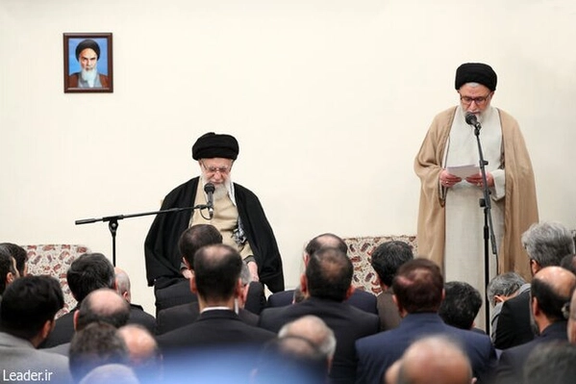
Iran’s Supreme Leader urged the country’s intelligence services to remain committed to the principles and ideology of the Islamic revolution and work closely with the government.

Iran’s Supreme Leader urged the country’s intelligence services to remain committed to the principles and ideology of the Islamic revolution and work closely with the government.
Ali Khamenei’s remarks on Wednesday, reported on Saturday, were made during a meeting with the ministry’s leadership to commemorate the 40th anniversary of its establishment.
“The Ministry of Intelligence must always cooperate fully with the government so that the current administration can carry out the heavy task of running the country well,” he said, adding that effective intelligence work is central to such cooperation.
The minister of intelligence and several other key ministers are directly selected by Khamenei . The structure reinforces the Supreme Leader’s overarching control over intelligence, military and security operations.
Esmail Khatib, the current intelligence minister delivered a report on countering security threats during the meeting, which highlights the direct line of accountability.
Khatib has been sanctioned by the US Treasury Department for his alleged role in cyber operations and human rights abuse. In 2022, Washington designated both him and the ministry of intelligence for involvement in cyber activities against the US and its allies.
He had also played a key role in suppressing Iran’s 2009 Green Movement protests and demonstrations since 2019.
In recent years, the intelligence arm of the Revolutionary Guard has also assumed a prominent role in suppressing dissent, often arresting more protesters and prominent figures and maintaining its own detention centers.
Khamenei’s comments come amid growing domestic discontent over misgovernance and inflation, as well as external pressure, particularly from US President Donald Trump’s reinstatement of his “maximum pressure” policy.
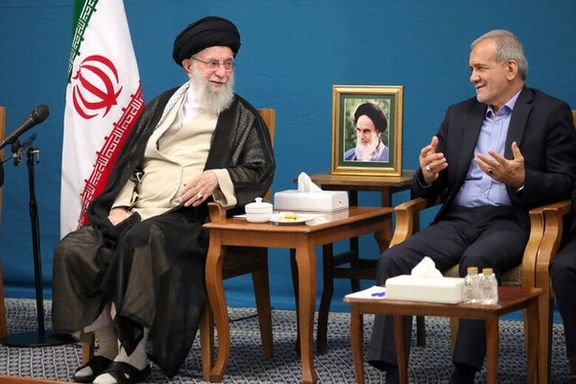
A senior member of the Iranian parliament (Majles) has proposed replacing Iran's problematic presidential election system with a model in which the Supreme Leader directly appoints the President.
Speaking to Didban Iran (Iran Monitor) on Thursday, Osman Salari, the deputy chairman of the parliament's legal committee, defended his proposed system, arguing that it “is not against religious democracy.” In Iran’s political structure, this form of pseudo-democracy restricts voter choice by allowing only candidates approved and shortlisted by the hardliner-dominated Guardian Council to appear on the ballot. In addition, political parties are severely restricted, and media is either government owned or monitored and controlled.
Salari added that although the Supreme Leader is the true head of the government, there is nothing wrong with him appointing a President to lead the executive branch.
Several Iranian media outlets and politicians have previously suggested replacing the public election of the President with a parliamentary system in which the President is chosen by members of parliament.
Public trust in the president's office and the tightly controlled election system has declined over the past 15 years, as it has become increasingly clear that the president has limited authority over major state issues.
According to the government-owned Iranian Students News Agency (ISNA), the parliamentary system was most recently discussed in January 2022 when the agency analyzed the pros and cons of the two systems, drawing on the views of prominent Iranian political scientist Hossein Bashirieh.
ISNA outlined the advantages and disadvantages in a report, stating, "In the presidential system, both the parliament and the President are elected by the people for fixed terms. The parliament cannot remove the President from office, although it can impeach him. Conversely, the President does not have the authority to dissolve the parliament."
ISNA contrasted this with the parliamentary system, noting, "In the parliamentary system, the parliament can dismiss the head of the government (usually a prime minister) by withdrawing its vote of confidence. The Prime Minister also has the power to dissolve the parliament and call for new elections." The report also highlighted that the separation of the three branches of government is more clearly defined in the parliamentary system.
The push by Iranian politicians and media to change the political system stems from the ongoing conflict between the Supreme Leader and the President since the establishment of the Islamic Republic in 1979. Since Khamenei became Supreme Leader the situation has gradually worsened as he has systematically monopolized power.
As Salari observed in his interview with Didban Iran, "all of Iran's former Presidents since 1989 have been accused of deviation," and Khamenei distanced himself from each of them before the end of their terms. Salari added that although these Presidents initially received Khamenei's endorsement, they often pursued political, economic, and social policies that diverged from his views. This divergence complicated decision-making, particularly on key economic and foreign policy issues.
Salari argued that “directly appointing presidents by Khamenei is still democratic because Khamenei was indirectly elected by the people.” However, this claim is controversial given the circumstances of his election by the Assembly of Experts, which was heavily influenced by its former deputy chairman, Akbar Hashemi Rafsanjani. Videos available online show Rafsanjani using his considerable influence to suppress opposition to Khamenei’s election.
In 2011, Khamenei expressed support for the idea of the president being elected by parliament, but he did not pursue it further despite the concept being revisited several times since then.
However, Salari's proposal is fundamentally different, as it places the choice of a president in the hands of one individual. It is unlikely that this idea will progress beyond mere suggestion, as Khamenei has consistently avoided taking direct responsibility for decisions that could significantly impact the structure of the government. He appears to prefer having a president elected by others, allowing him to distance himself and criticize the president if things go wrong.
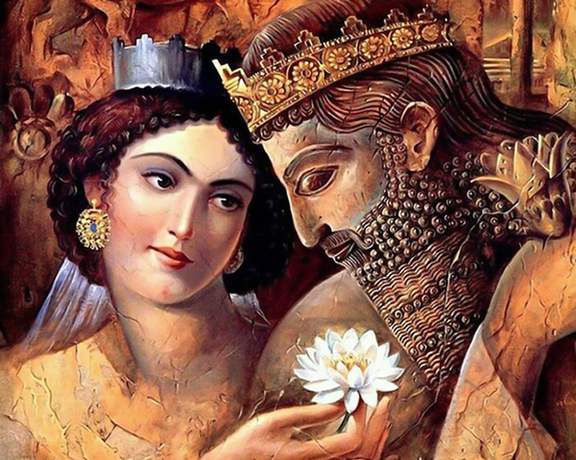
Iran’s religious and political establishment is increasingly concerned that the growing popularity of pre-Islamic festivals, like Espandgan—celebrated as an alternative to Valentine’s Day—poses a threat to Islamic culture.
Over the past two decades, Valentine’s Day has grown increasingly popular in Iran, frustrating authorities who have spent nearly half a century trying to Islamicize society and shield young people from Western cultural influences.
In 2010, Iran’s police and judicial authorities condemned Valentine’s Day celebrations as part of a “Western cultural onslaught”, imposing a ban on businesses selling Valentine’s Day gifts and decorations.
Since then, police have occasionally cracked down on shops selling gifts and cafés hosting Valentine’s celebrations, where young people gather with red balloons, roses, teddy bears, and other tokens of affection. Despite these efforts, Valentine’s Day has continued to gain popularity, even spreading to religious cities such as Qom and Mashhad, home to two of Shiism’s most important shrines and seminaries.

A call to revive Sepandarmazgan
Beyond government opposition, some Iranians also criticize the growing influence of Western holidays, advocating for the revival of ancient Iranian festivals instead. They argue that Sepandarmazgan, or Espandgan for short, offers a more culturally authentic alternative to Valentine’s Day.
Falling on February 23 this year, Sepandarmazgan is dedicated to Sepandarmaz (Holy Devotion), one of the seven divine entities emanating from Ahura Mazda, the Zoroastrian creator god.
In ancient Iranian tradition, Sepandarmaz was revered as a feminine divine force linked to the Earth and women, symbolizing fertility and prosperity. Unlike Anahita—an earlier goddess of love, fertility, and water whose worship was later absorbed into Zoroastrianism—Sepandarmaz was never portrayed in human form in ancient artifacts.
Sending text messages and giving gifts to loved ones on Espandgan instead of Valentine's Day has been gaining popularity in recent years.
According to a recent article published by the Student News Network, a hardline news outlet, presenting Espandgan as an alternative to Valentine’s Day fails to prevent the spread of Western cultural values. Instead, it merely repackages the same concepts in a form that contradicts the Islamic way of life.
Espandgan in history and modern Zoroastrianism
Iran’s Zoroastrian community, though now small, continues to celebrate Espandgan with solemn religious rituals and prayers, including recitations from the Avesta—their holy book—at fire temples and sacred shrines, such as Pir-e Sabz in Yazd.
According to the 11th-century historian Al-Biruni, however, Espandgan was widely observed in parts of Iran as a day honoring women. On this occasion, women were exempt from housework, and men showered their wives with gifts. Additionally, women freely expressed their love to the men they wished to marry, a tradition that resonates with modern romantic celebrations.
Government opposition to pre-Islamic traditions
Despite the historical significance of Espandgan, Iran’s religious and political establishment remains resistant to promoting pre-Islamic festivals as substitutes for Western celebrations like Valentine’s Day and Christmas—both of which remain widely celebrated despite official disapproval.
In recent years the celebration of Christmas has also become very popular in Iran.
Beyond Valentine's Day, the hardline religious and political establishment also opposes other ancient festivals including the Winter Solstice festival of Yalda (or Shab-e Chelleh) which marks the longest night of the year, and Charshanbeh Soori, a bonfire festival held on the evening of the last Tuesday before the Iranian New Year (Nowrouz) as relics of paganism.
Charshanbeh Soori often turns into a battle between the merry-making youth who celebrate it on the streets and the police, Basij militia of the Revolutionary Guards, and vigilante groups who crack down on them in larger cities such as Tehran.
In an attempt to counter pre-Islamic traditions and calendar events, authorities have sought to elevate Islamic occasions, designating the birthday of Fatima, daughter of Prophet Muhammad, as Women’s Day. The birthday of Imam Ali, the first Shiite Imam, has similarly been designated as Men’s Day while the anniversary of Fatima and Ali’s marriage has been added to the official calendar as Marriage Day.
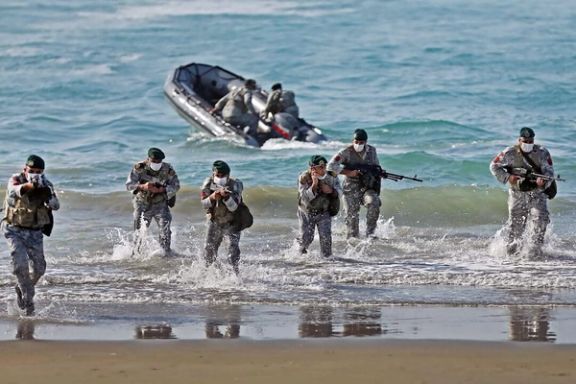
Iran’s armed forces are set to begin a large-scale military exercise dubbed Zolfaghar 1403 on Saturday as tensions with Israel and the United States persist over Tehran’s nuclear program.
The drills, led by the Iranian Army, will span an area from the Makran, in southeastern Iranian coast, to the northern Indian Ocean, covering strategic waters up to the 10-degree latitude.
The Makran coast, which lies along Iran’s border with Pakistan on the Arabian Sea, is a key military and economic zone, home to the country's growing naval infrastructure.
Admiral Habibollah Sayyari, the commander of the exercise, warned that any attack on Iranian interests would not go unanswered. He said, “Any enemy that thinks it can harm our interests on land, in the air, or at sea will certainly suffer great damage.”
He added that the Zolfaghar 1403 exercise will demonstrate Iran’s latest military capabilities, showcasing the strength of ground forces, air defense, strategic naval forces, and the Joint Air Defense Headquarters.
Sayyari’s remarks come amid reports that Israel is considering launching an attack on Iranian nuclear sites as early as the first half of this year.
According to The Wall Street Journal and The Washington Post, US intelligence findings from last month indicate that Israel views Iran as vulnerable following the October 26 Israeli air strike, which reportedly knocked out large portions of Iran’s air defenses. The reports also suggest that Israel perceives increased US willingness to support military action, particularly with President Donald Trump back in the White House.
During a recent visit to Washington, Israeli Prime Minister Benjamin Netanyahu said that Israeli strikes had "crippled Iran's air defenses."
While Zolfaghar 1403 is an Army-led exercise, Iran has also recently conducted joint drills between the Iranian Army and the IRGC, focusing on defending key nuclear sites such as Natanz and Fordow.
The exercises, which are set to continue until mid-March, come after Iran unveiled the Zagros, its first signals intelligence (SIGINT) vessel for electronic surveillance. Additionally, Iran has expanded its drone fleet, receiving 1,000 new drones to bolster its capabilities.
As Iran ramps up its military posture, US Central Command (CENTCOM) and the Israeli Defense Forces (IDF) are closely coordinating on regional security.
On Wednesday, CENTCOM Commander Gen. Michael Erik Kurilla hosted IDF Chief of Staff Lt. Gen. Herzi Halevi at headquarters in Tampa, Florida, where they discussed Iran’s growing influence along with the ceasefire in Gaza, hostilities in Lebanon, and the Iran-backed Houthis in Yemen. The CENTCOM statement, published on Thursday, reaffirmed the deep US-Israel military partnership as both countries assess Tehran’s actions in the region.
Last month, 110,000 paramilitary Basij forces took part in a large-scale IRGC drill aimed at preparing for potential security threats in Tehran.
With Iran ramping up military activities across multiple fronts, the region remains on high alert as the country signals its readiness to counter any external threats. Iranian military commanders have been making frequent statements about their military capabilities, and recently have renewed direct threats against Israel.
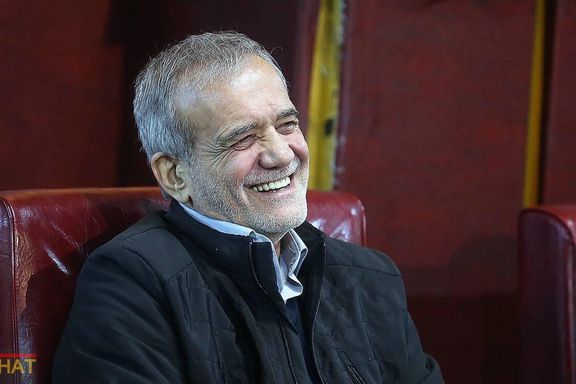
Hardliners in Tehran keep blaming other officials for Iran’s economic crisis, despite broad recognition that US sanctions and the state-controlled economy are the main causes of inflation and currency devaluation.
The dominant hardline faction in the Iranian parliament is pushing to impeach Economy Minister Abdolnaser Hemmati just six months into his tenure, despite the economic crisis dating back to 2018, when then-President Donald Trump withdrew from the JCPOA nuclear deal and imposed strict sanctions.
In a show of support for his embattled economic team, President Masoud Pezeshkian visited Central Bank Governor Mohammad Reza Farzin on Tuesday and met with Economy Minister Abdolnaser Hemmati on Wednesday, following the formal submission of the impeachment motion against him.
Nonetheless, Pezeshkian’s appearance in parliament to defend his ministers did not stop the impeachment process from moving forward.
Although the parliamentary session was confidential, hardline lawmaker Hamid Rasai secretly recorded part of the proceedings and shared the footage on social media. The video captured Rasai sharply criticizing Hemmati, Farzin, and Pezeshkian himself.
Qasem Ravanbakhsh, an ultraconservative MP from Qom, sarcastically told reporters that during the meeting, Pezeshkian tried to blame everyone but himself for the country’s economic problems.
In response, Pezeshkian shared a video of his meeting with the economy minister, emphasizing that key economic policies were collectively decided by the country's leadership. He said, “I told the Majles that all banking, monetary, and foreign exchange policies were approved at meetings of the heads of the three branches of government, with Hemmati and Farzin also present. The minister did not set these policies. If anyone is to be blamed for the economic problems, it’s us—the heads of the three branches of government. So, come and arrest us!”
“To blame only one person is unfair,” Pezeshkian added.
Leaving some in the room perplexed, Pezeshkian continued by reciting a verse of classic Persian poetry by South Asian poet Sir Muhammad Iqbal of Lahore (1877–1938). The lines—“Open your eyes to yourself and close your eyes to others. Learn how to see and hear differently.”—did little to address the economic crisis, leaving many unsure of his intended message.
The pro-reform website Rouydad24 attributed Iran's economic troubles to US sanctions and regional tensions, including conflicts with Israel and Trump’s recent move to tighten sanctions. The site overlooked deeper structural issues within Iran’s economy and the disorganized political system that have also fueled the crisis.
Conservative politician Ali Mohammad Namazi told Nameh News that "People need to be convinced that the country's problems can be solved. However, Pezeshkian has failed to assure them that this is possible."
"Iranians are suffering from longstanding issues, and only effective solutions can restore their confidence," he added.
Namazi also warned that "people can no longer tolerate the economic hardships. They are struggling to live normal lives, and public dissent is growing. They might wait in the hope of a government solution, but this patience won’t last forever. Eventually, they will be compelled to protest."
The politician emphasized the urgency for officials to act swiftly, noting that lifting sanctions is the only way to address rising prices and inflation. He warned that without prompt action, the situation could become unpredictable if the inflation rate exceeds 50 percent.
He argued that Pezeshkian cannot claim ignorance of the country’s problems, given his extensive political experience as a multi-term parliament member and a former cabinet minister.
Pezeshkian’s main political rival is ultraconservative Saeed Jalili, who, according to Khabar Online, has obstructed nearly every initiative the president has pursued since June. This includes efforts to ease the compulsory hijab rule to gain women’s support, lift the ban on social media to appeal to young Iranians, and initiate minimal economic reforms.
Yet, despite the significance of this political rivalry, it is not Pezeshkian's biggest challenge. His primary issue is his admission during the election campaign that he had no clear plan for governing the country. This raises the question of how he managed to secure votes, even from the minority of Iranians who participated in the lackluster election, despite openly acknowledging his lack of a strategic agenda.
During the televised debates before the June election, Pezeshkian asked Jalili, “What will you do if Trump wins the US election?” Jalili confidently responded, “I have a plan. What about you?” Pezeshkian replied, “I will consult with experts.” Yet, if he has any expert advisors, they seem to have offered little in terms of solutions for the current impasse.
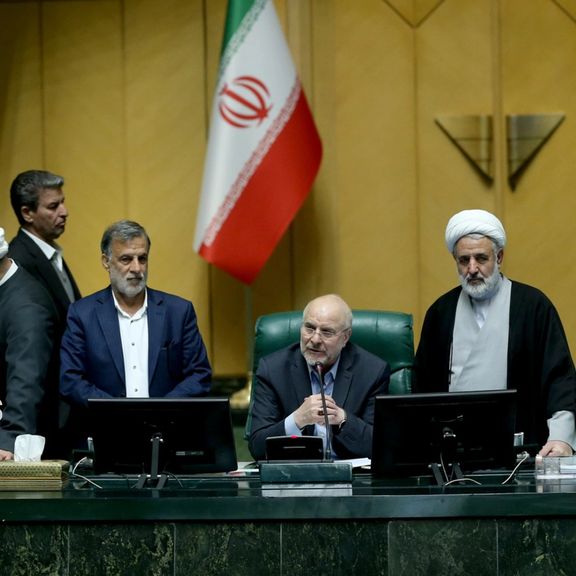
Mohammad Bagher Ghalibaf, the Speaker of the Iranian Parliament, proposed that one representative for Iranians living abroad be allocated to the parliament for each continent.
He made the proposal on Wednesday during a meeting with Iranians residing in Azerbaijan, where he partook in the Asian Inter-Parliamentary Assembly.
"We believe that for each continent, one Iranian living abroad should come to the parliament as a representative and, with seasonal or monthly visits to their constituency, follow up on the issues of Iranians residing abroad through embassies or consulates," he said.
Ghalibaf pointed out that despite the population of approximately six million Iranians living abroad, they have no representation in the parliament, while religious minorities with much smaller populations have members.
The speaker stressed the necessity of hearing the voices of Iranians abroad in the parliament, saying that this requires institutional and structural work and the implementation of all legal regulations for holding elections.
He said that this measure could pave the way for investment from abroad, adding that it would establish a systematic connection with Iranian citizens who live outside of Iran but are devoted to their homeland.
According to Ghalibaf, the reform will be continued in cooperation with the Ministry of Foreign Affairs.
He sidestepped the issue of conflicting loyalties, though naturalization processes in many countries require an oath of allegiance to the new nation.
While dual citizens can serve in their original country's parliament, the potential for divided loyalties remains a complex issue, addressed differently by various countries.